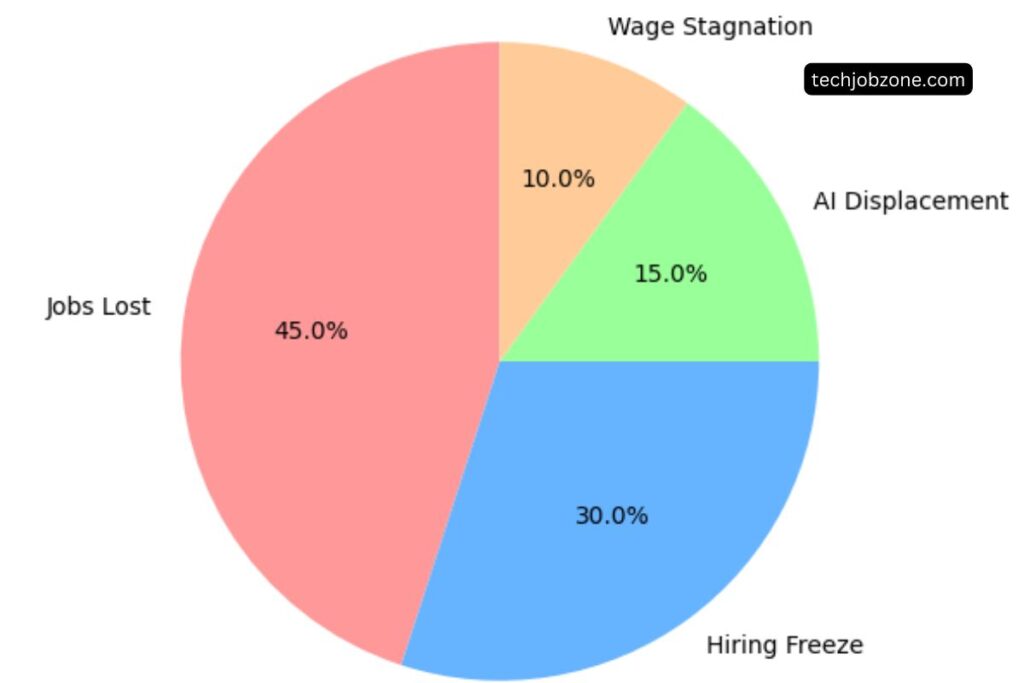As the calendar flips to 2025, a troubling trend is gripping the tech industry and beyond: a white collar recession. Once considered the backbone of job security, white collar roles—especially in technology, finance, and consulting—are facing unprecedented layoffs and hiring freezes.
With major tech giants like Google, Meta, and Amazon slashing thousands of jobs, experts are sounding the alarm about a “white collar recession 2025” that could redefine the professional landscape. What’s driving this shift, and what does it mean for workers and the broader economy? Let’s dive in.
Tech Layoffs Spark White Collar Recession Fears
The term “white collar recession” has gained traction in 2025 as high-profile companies announce significant cuts to their professional workforces. Unlike traditional recessions that hit blue-collar industries hardest, this downturn is zeroing in on office-based, knowledge-worker roles.
Data from Layoffs.fyi reveals that tech giants including Google, Meta, Amazon, Microsoft, and Salesforce have collectively shed tens of thousands of jobs since 2024, with the trend accelerating into early 2025. Consulting firms like Deloitte and PwC have followed suit, cutting over 9,000 white collar positions combined.
Read Also: UT Austin Shocker: Interim President Ousts Provost in Bold Shift
This isn’t just a blip. The U.S. professional and business services sector—a cornerstone of white collar employment—has lost 248,000 jobs since May 2023, marking 17 consecutive months of decline, the longest streak since the 2008 financial crisis.
Hiring rates for these high-earning roles have plummeted to levels not seen in over a decade, according to a 2024 Vanguard report. For tech workers and other professionals, the white collar recession 2025 is no longer a prediction—it’s a reality.
Why Is the White Collar Recession 2025 Happening?
AI and Automation Take Center Stage
One major driver of the white collar recession 2025 is the rapid rise of artificial intelligence (AI) and automation. Companies are leaning on AI tools to streamline operations, cutting the need for human workers in roles like data analysis, content creation, and even middle management.
For example, JPMorgan’s AI system, COIN, processes thousands of loan agreements in seconds—a task that once took humans hundreds of thousands of hours annually. As AI becomes more sophisticated, it’s not just repetitive tasks at risk; complex white collar jobs are being displaced too.
This shift isn’t limited to tech. Financial firms like Goldman Sachs and Citigroup have trimmed thousands of jobs, citing AI-driven efficiencies and cost-cutting needs. The white collar recession 2025 is proving that no industry is immune when technology can do the job faster and cheaper.
Post-Pandemic Recalibration
Another factor fueling this downturn is a post-pandemic workforce recalibration. During the COVID-19 boom, tech companies overhired to meet surging demand for digital services. Now, as the economy stabilizes, they’re shedding excess staff.
“Big tech realized it over-hired during the pandemic and decided it was time to trim the fat,” notes Tony Yiu of Alpha Beta Blog. The result? A white collar recession 2025 that’s hitting software engineers, project managers, and HR professionals particularly hard.
Economic Uncertainty and Cost-Cutting
Global economic pressures—think inflation, rising interest rates, and geopolitical tensions—also play a role. Companies with healthy cash reserves, like Amazon and Microsoft, are still cutting white collar jobs, not out of desperation but as a preemptive move.
“Economic uncertainty driven by elections and wars in Europe and Asia is causing firms to trim costs now, just in case,” says a Pepper Foster analysis. This cautious approach is amplifying the white collar recession 2025, even as corporate profits remain robust.
How the White Collar Recession 2025 Differs from Past Downturns

Unlike the 2008 financial crisis, which cratered the entire economy, the white collar recession 2025 is strikingly selective. Blue-collar sectors like construction, manufacturing, and logistics are thriving, buoyed by infrastructure projects and e-commerce growth.
The Bureau of Labor Statistics reports steady job vacancies in these areas, with unemployment rates hovering around 3.5%—a stark contrast to the 4.0% rate in professional services by mid-2024.
This dichotomy is what makes the white collar recession 2025 so unique. While overall U.S. unemployment sits at a healthy 4% in January 2025, white collar workers are struggling to find new roles. “It’s a recession for the Patagonia-vest set,” quips The Economist, highlighting how high earners are bearing the brunt. For tech professionals earning over $96,000, hiring has hit its lowest level since 2014, per Vanguard data.
The Impact on Tech Workers and Beyond
Job Searches Turn Brutal
For those caught in the white collar recession 2025, the job market is a battlefield. A 2024 survey by the American Staffing Association found that 40% of white collar applicants couldn’t land a single interview—an unheard-of struggle for skilled workers. On LinkedIn, posts about “500 applications, 8 months, no offers” have become all too common. “Rejection after rejection makes you question your worth,” one tech veteran with 30 years of experience told Business Insider.
Salary Stagnation and Down-Leveling
Even for those who keep their jobs, the white collar recession 2025 brings stagnation. Bonuses are on hold, and salary increases are scarce as companies tighten belts. Some professionals are “down-leveling”—taking lower titles or pay just to stay employed. “The balance of power has shifted back to employers,” Glassdoor economist Daniel Zhao told Newsweek, signaling a tough road ahead for career advancement.
Ripple Effects on the Economy
The white collar recession 2025 isn’t just a personal crisis—it’s an economic one. High earners drive consumer spending on cars, homes, and luxury goods. As their incomes falter, retail sales could cool, as seen in a January 2025 dip reported by CNN. While blue-collar demand props up parts of the economy, a prolonged white collar downturn could drag growth down, especially if GDP slows to the forecasted 0.5% in early 2025, per Georgia State University.
What’s Next for the White Collar Recession 2025?

Signs of Stabilization—or More Pain?
Some experts see light at the end of the tunnel. Indeed’s Job Postings Index suggests white collar hiring is stabilizing in 2025, rather than declining further. “The pendulum might swing back in workers’ favor soon,” Fortune reports, pointing to potential tech and finance rebounds if the economy strengthens. Others, however, warn of deeper structural shifts. AI’s relentless march and remote work’s permanence could mean many white collar jobs never return.
Government Steps In
A wild card in the white collar recession 2025 is government intervention. The U.S. Department of Government Efficiency (DOGE), launched in January 2025 under Elon Musk’s leadership, aims to cut federal jobs using AI. If successful, this could set a precedent for private-sector downsizing, intensifying the recession. Meanwhile, states and cities are adopting AI chatbots, stalling growth in administrative roles.
Navigating the White Collar Recession 2025
For tech workers and other professionals, adaptability is key. Upskilling in AI, robotics, or quantum computing—fields less likely to be automated—could offer a lifeline. “Study computer science and electrical engineering,” advises an industrial control engineer on Slashdot, noting demand for hands-on tech roles remains high. Building a robust emergency fund and networking aggressively are also smart moves in this uncertain climate.
Companies, too, must rethink their strategies. Cutting white collar roles boosts short-term profits, but losing talent could hurt innovation long-term. “Firms risk diminishing experience levels,” warns Korn Ferry’s John Long, urging a balance between efficiency and growth.
Read Also: Skype’s Shutdown by Microsoft: Job Market Shifts You Need to Know
Illinois Schools Defy Federal Cuts to DEI: Job Market Impacts Unveiled
The Future of Work in a White Collar Recession
The white collar recession 2025 is more than a tech layoffs story—it’s a wake-up call. As AI reshapes industries and economic priorities shift, the very nature of professional work is evolving. Will this be a temporary adjustment or the start of a decades-long transformation? Only time will tell, but one thing’s clear: resilience and reinvention will define success in this new era.
What’s your take? Are you feeling the pinch of the white collar recession 2025, or do you see opportunities amid the chaos? Drop your thoughts in the comments—I’d love to hear how you’re navigating this tech-driven shakeup!

